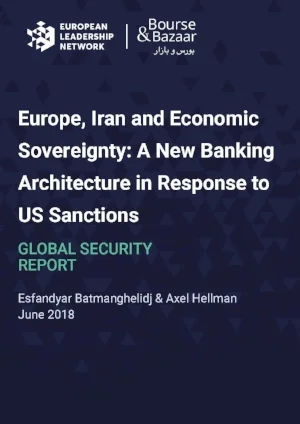A New Banking Architecture in Response to US Sanctions
Download
June 2018 - 24 Pages
Please enter your email address in order to download the full report.
Executive Summary
By Esfandyar Batmanghelidj and Axel Hellman
On May 8, U.S. President Donald Trump announced that the United States would unilaterally withdraw from the 2015 international nuclear agreement with Iran, known as the Joint Comprehensive Plan of Action (JCPOA). The Trump administration is now set to pursue a “maximum pressure” campaign against Tehran. As part of this approach, all U.S. sanctions lifted pursuant to the JCPOA will be re-introduced, the few licenses enabling certain exemptions to U.S. sanctions will be revoked, and “additional economic penalties” will be devised.
From the Iranian perspective, the return of U.S. sanctions means a lost opportunity for growth and international engagement, but not an impending economic catastrophe. From a European perspective, sustaining economic exchange with Iran is not about advancing economic gains but rather about consolidating an agreement which is driven by pragmatic security concerns. The shared elements are clear—Iranian and European policymakers alike are foremost motivated by a need to salvage the JCPOA and thereby protect their economic sovereignty and autonomy in international relations.
To support these ends, this paper presents a vision of a new banking architecture that must be at the heart of Europe’s package to protect Europe-Iran economic ties. This banking architecture should be designed not to evade US sanctions, but to ensure that those companies that can operate in compliance with U.S. secondary sanctions have access to the necessary banking services.
The design of this architecture should be presented to Tehran not as a “turnkey” initiative that can simply be switched on, but rather as a part of a comprehensive “roadmap” for joint European and Iranian implementation, in pursuit of expanded economic relations.
The architecture should have two main elements:
It should be centered on “gateway banks”—financial institutions which can serve as intermediaries between major Iranian and European commercial banks.
It should be overseen by an “EU-OFAC,” a regulatory authority modeled on the U.S. Treasury Office of Foreign Assets Control, but with a philosophy of operation geared towards facilitation of trade rather than restriction.
EU-OFAC would pursue measures in two domains:
Compliance:
EU-OFAC would develop common standards, tools, and certification mechanisms for due diligence to enable European businesses and banks to have greater confidence about the compliance of their activities, thus addressing a longstanding issue with the interpretive guidance issued by the United States.
Drawing on a successful model developed in Germany, EU-OFAC would supportcollaborative efforts to increase the reliance on and reduce the costs of duediligence among the gateway banks.
EU-OFAC would also assist European companies in seeking waivers and exemptions from U.S. authorities and act as an interlocutor between European companies andU.S. authorities.
Legal Protection:
EU-OFAC would strengthen EU legal protections for entities engaged in Iran trade and investment by developing guidelines related to a strengthened blocking regulation, creating linkages to laws that underpin the Single European PaymentsArea (SEPA) and to non-discrimination in the provision of banking services.
The findings of this paper are informed by discussions held at Bourse & Bazaar's Iran Financial Future Summit on May 29, 2018 in Brussels, Belgium.





